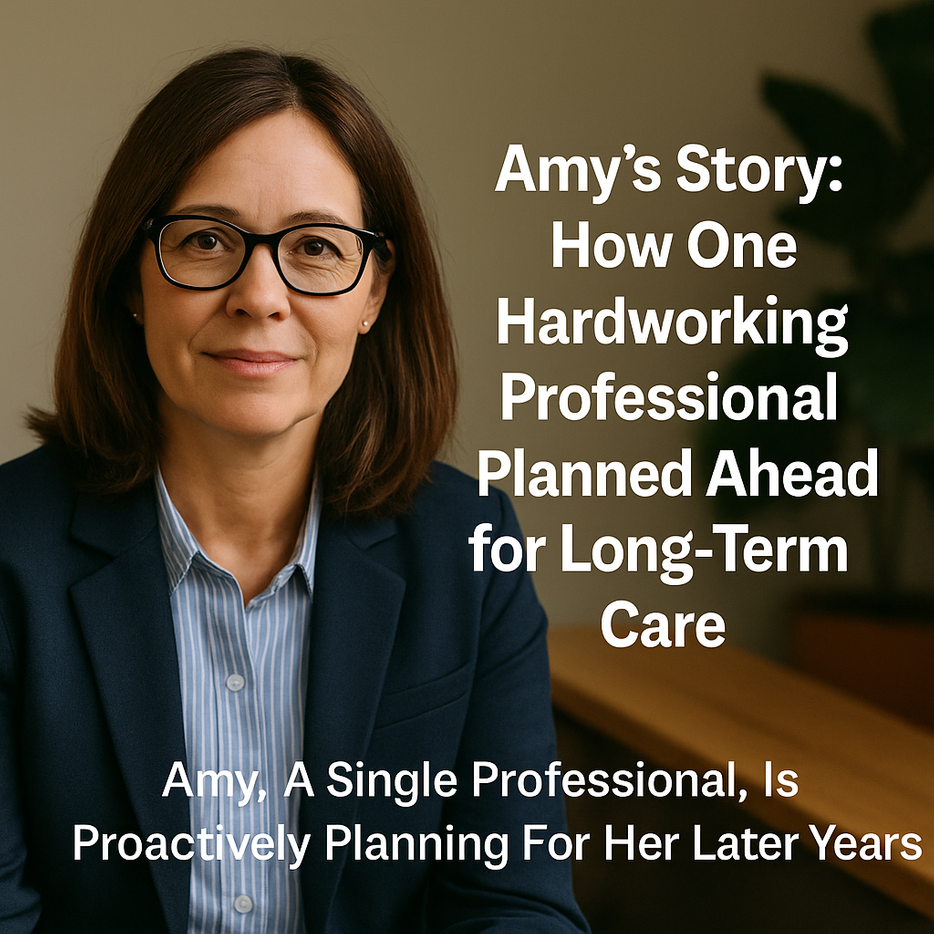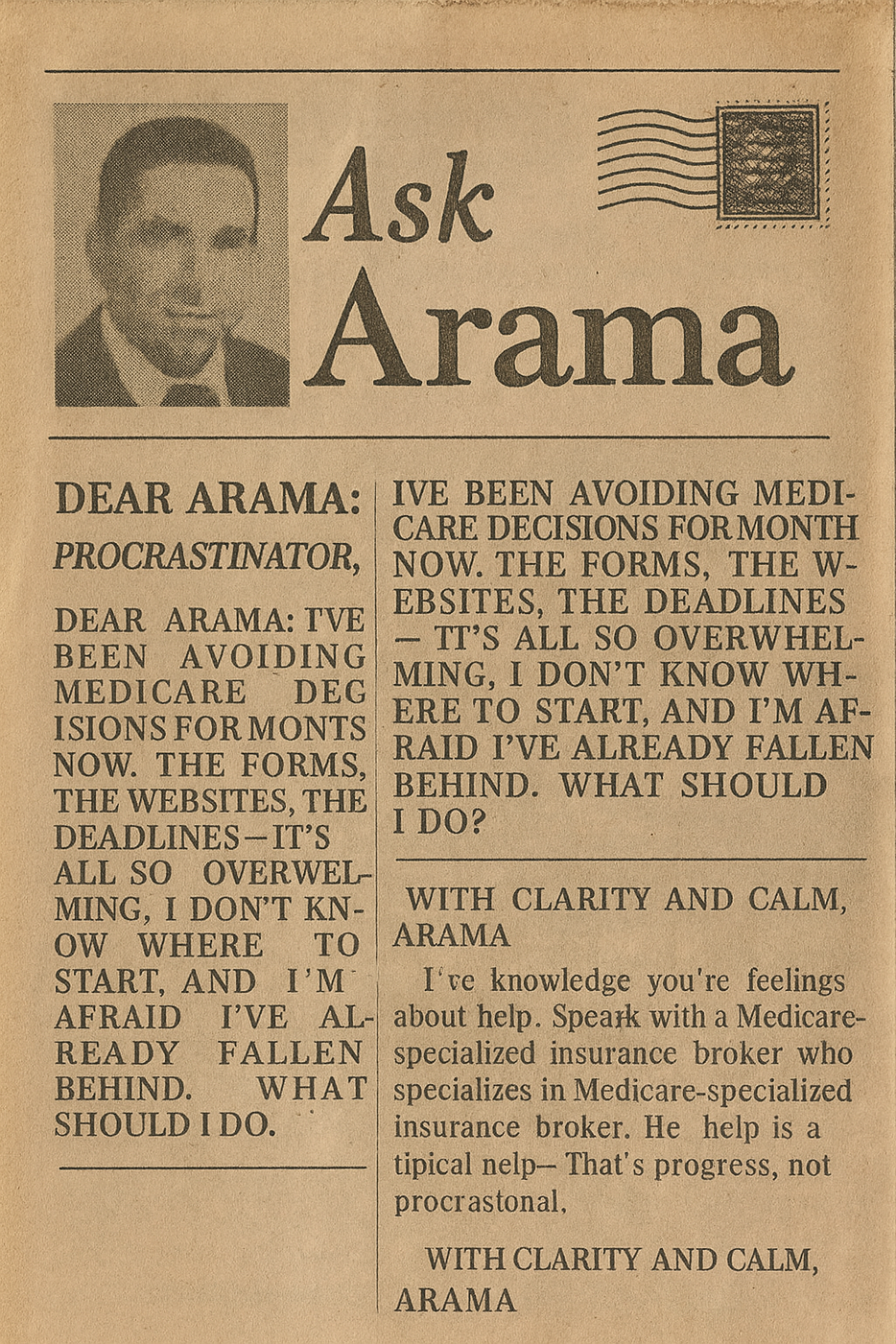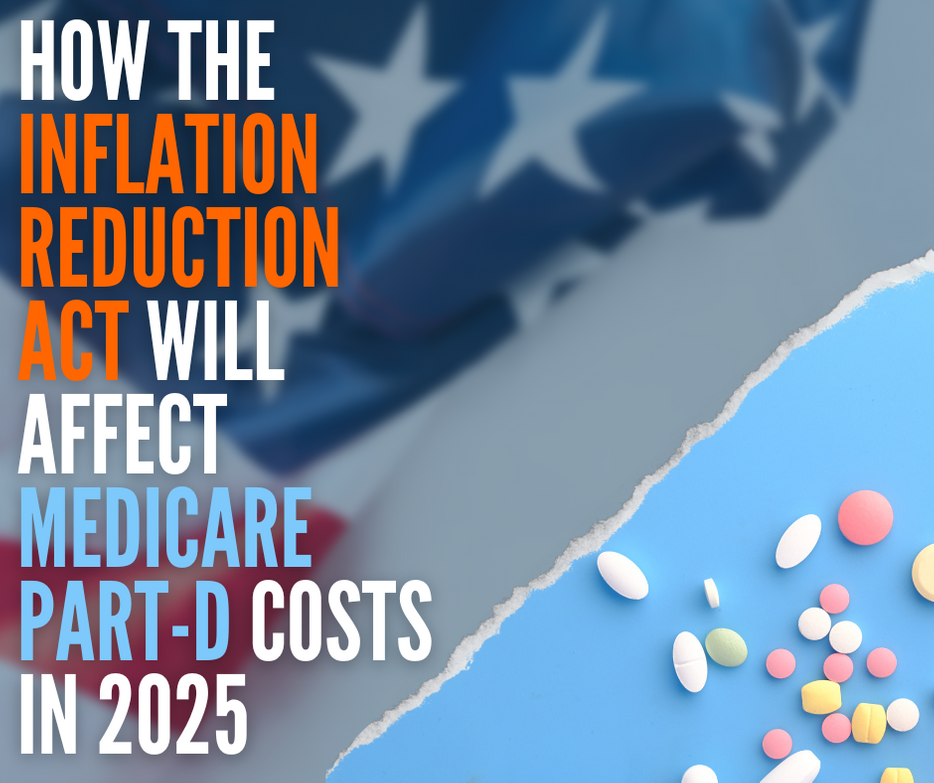Blog
Recent Articles
Amy's Story
Meet Amy: Amy was a comptroller at a mid-sized company. She loved her work, she loved numbers, and she loved the independence her career gave her.
But here’s the thing—Amy was single. She didn’t have kids, and she wasn’t planning on having any. One night over dinner with a friend, it hit her:
“If I ever need long-term care, who’s going to help me? I don’t want to leave that stress to my nieces or my sister.”
So, Amy decided it was time to put a plan in place.
First Step: Facing the “What If”
Like a lot of people, Amy didn’t want to think about nursing homes or assisted living. But she knew ignoring the problem wouldn’t make it go away. Long-term care is expensive, and if she ended up needing it, she didn’t want to wipe out her savings.
She started by looking at traditional long-term care insurance. It worked like any other insurance: she’d pay premiums every year, and if she needed care, the policy would cover it.
But there was a problem. If she never used it, the money would be gone. For someone as practical as Amy, that felt like throwing dollars into a black hole.
moreHappy Birthday Social Security!
Today, we remember the Social Security Administration’s 90th anniversary. That’s how long the Social Security Administration (SSA) has been around. Since President Franklin D. Roosevelt signed the Social Security Act into law on August 14, 1935, the program has grown considerably. It’s turned into a real safety net for millions of Americans, including widows, divorced folks and disabled kids.
https://www.ssa.gov/agency/commissioner/assets/materials/COSS-Open-Letter-90th-Anniversary.pdf
Social Security Was Born in a Crisis
Back in 1935, the U.S. was in the middle of the Great Depression. Jobs were scarce, banks were failing, and people were seriously struggling. The Social Security Act was signed into law to help older Americans who didn’t have much to fall back on. At that time, the program was meant to provide retirement income for workers once they hit age 65.
In 1935, the average life expectancy in the United States was approximately 61. So yeah, a lot of folks didn’t actually make it to retirement age. Still, the idea was bold—to protect workers from poverty when they couldn’t work anymore.
moreThe Great Medicare Pullback Part 2-The Sequel
Something big has been happening in the world of Medicare coverage. Major insurance companies like UnitedHealthcare, Humana, Aetna, Cigna, and Allstate are feeling the pressure of rising healthcare costs, tighter government rules, and something called medical loss ratios (MLR). MLR requires insurance companies to spend at least 80% or 85% of premium dollars on medical care, rather than on administrative costs or profits.
Source: CMS.gov – Medical Loss Ratio
In a move that's already being called the “Great Medicare Pullback,” there is a widespread reduction in Medicare Advantage plan offerings, network breadth, and benefits across regions. The pullback even includes Allstate Medigap plans exiting the Medicare space altogether! This pullback started late last year, and it seems to be carrying over to 2026.
UnitedHealthcare (UnitedHealth Group)
Strategic pullback: In response, United plans to exit MA plans covering over 600,000 members, with premium increases and benefit modifications expected in 2026. It aims to restore margins to 2–3% by 2026, down from larger past expectations.
moreMEDICARE PART B, WHEN DO YOU SIGN UP?
So, you’re over 65, still working (or recently stopped), and had health insurance through your job. But now that coverage is ending, you're wondering how to get Medicare Part B without paying a penalty or getting stuck without insurance.
If you didn’t sign up for Medicare Part B when you turned 65 because you had job-based insurance, that’s totally fine! Medicare gives you a Special Enrollment Period (SEP) to sign up after that coverage ends.
BUT—and this is important—you only get 8 months from the time your job-based insurance ends to sign up, or you might have to pay a monthly penalty for the rest of your life.
When employer coverage ends, whether because you are retiring or choosing to drop your work insurance, you qualify for this Enrollment Period.
Two essential forms you'll need:
-
CMS‑40B – Application for Enrollment in Medicare Part B
-
CMS‑L564 – Request for Employment Information (the "losing employer coverage" form)
📄 Form #1: CMS‑L564 (Request for Employment Information) https://www.cms.gov/cms-l564-request-employment-information
moreSame Hospital, Two Very Different Experiences: Medicare Advantage vs. Medigap at Cleveland Clinic Vero Beach
The Cleveland Clinic Indian River Hospital in Vero Beach has earned a reputation for excellence, with nationally recognized physicians, state-of-the-art technology, and a community-focused approach. Yet, for Medicare beneficiaries, experiences at this same hospital can differ dramatically—depending solely on the type of Medicare coverage they have.
While the building, staff, and services remain the same, the pathway to care, billing surprises, wait times, and access to specialists often diverge widely between Medicare Advantage members and those with a Medigap plan. Understanding this divide is essential—especially if you're planning your retirement healthcare or helping a loved one navigate their Medicare options.
The Cleveland Clinic Vero Beach : A Closer Look
Located in Indian River County, Cleveland Clinic Vero Beach offers a broad array of services including cardiology, orthopedics, oncology, neurology, and emergency care. It is part of the globally respected Cleveland Clinic Health System, bringing world-class standards to the Treasure Coast.
moreA Letter From A Procrastinator
Today, I found myself reminiscing about the classic advice columns from the '80s—think Dear Abby. (If you're under 40, just hang in there with me for a moment—this'll make sense soon, I promise.)
Yes, I’m definitely old enough to remember those days!
So, I figured—why not write this blog in that same nostalgic style?
And again, if you're under 40, stay with me—this format has some timeless charm
DEAR ARAMA: I'll be honest: I’m a procrastinator. If something feels even slightly complicated—especially anything to do with forms, insurance, or deadlines—I tend to put it off. So when I got close to turning 65 and knew I’d need to figure out my health insurance, I did what I always do: nothing.
I told myself I’d get around to it. Eventually. But the truth is, this kind of stuff doesn’t wait.
Here’s what I learned the hard way—and I would appreciate any feedback on what I could have done differently.
I Assumed My Job’s Insurance Would Just Keep Going
I was still working when I turned 65 and figured I didn’t need to do anything. Boy was I wrong! Although I had insurance through my job, I didn’t realize that once you hit 65, Medicare becomes part of the picture, even if you’re still employed.
moreThe "Sandwich Generation"
The Rising Cost of Healthcare as Adult Children of Aging Parents
Understanding the Healthcare Crisis from a Family Perspective
Healthcare in America has become not just a personal concern but a multi-generational crisis. For adult children with aging parents, the cost of care presents a painful paradox—how to provide quality care for their elders while still planning for their children’s education and stability.
As hospitals raise prices, insurance premiums climb, and out-of-pocket costs soar, families across income levels are feeling the squeeze. It’s no longer just about access; it’s about impossible choices. Parents once saved for their children’s future. Now, roles have reversed—and with a much heavier price tag.
Why Healthcare Costs Are Rising So Rapidly
The causes of rising healthcare costs are complex. From pharmaceutical markups and administrative overhead to the growing demand for chronic care and limited provider competition, each factor contributes to a ballooning system.
Key reasons include:
-
High cost of prescription drugs
-
Hospital consolidation reducing competition
more
How the Inflation Reduction Act Will Affect Medicare Part D Costs in 2025
The Inflation Reduction Act (IRA), passed in 2022, introduces several significant changes to Medicare Part D, particularly impacting out-of-pocket costs for beneficiaries starting in 2025. These changes are designed to make prescription drugs more affordable and accessible, but they also present challenges for private insurers who administer Part D plans. Here’s a closer look at what to expect:
1. Capping Out-of-Pocket Costs
One of the most notable provisions is the introduction of an annual out-of-pocket cap for Medicare Part D beneficiaries. Starting in 2025, the cap will be set at $2,000. This means that once a beneficiary has spent $2,000 on covered prescription drugs in a year, they won’t have to pay any more out-of-pocket costs for the rest of that year.
Impact on Beneficiaries:
• Increased Affordability: This cap significantly reduces the financial burden on those who require expensive medications or have chronic conditions.
more







